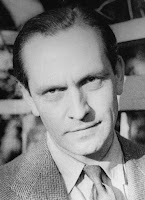“What I enjoy is working on a scene until I finally get it right. It's fun to know you're hitting it. There are advantages in being in a long run. You should see plays after they've been around for a while if you want to see the best performances…. The actors are more relaxed in their parts. When I first consider a part, I find myself judging the play as a whole. Simultaneously, I try to decide whether I can play the part, whether it's dramatically interesting, whether I feel I can make it make sense. It's a mistake, I think, to go for parts, as some actors do, instead of for the play as a whole. I'll never do a part in a play or a picture that makes me lose my self-respect…. In a way, though, I've liked everything I've been in. I'm kind of a dimwit. I just like to act.”—American screen and stage actor Fredric March (1897-1975), quoted in Lillian Ross and Helen Ross, The Player: A Profile of an Art (1962)
Two-time Oscar-winning actor Fredric March was
born Ernest Frederick McIntyre Bickelin in Racine, Wisc., 125 years ago today. Over
a long career on the big screen and the stage, he seldom if ever had to worry
about losing his “self-respect.”
It wasn’t enough that the enormously versatile star
could do comedy (Nothing Sacred, I Married a Witch) as well as tragedy
(the original A Star is Born, Anna Karenina), that his Academy
Award performances in Dr. Jekyll and Mr. Hyde and The Best Years of
Our Lives still stand the test of time, or that he segued expertly from a matinee
idol of the Thirties and Forties into an adept ensemble player from the Fifties
to his death in 1975.
No, when it came time for directors to find a leading
man unafraid to take on two highly demanding properties by Pulitzer
Prize-winning playwrights—Thornton Wilder (The Skin of Our Teeth) and
Eugene O’Neill (Long Day's Journey Into Night)—they turned to March. He
did not let them—or audiences—down.

No comments:
Post a Comment